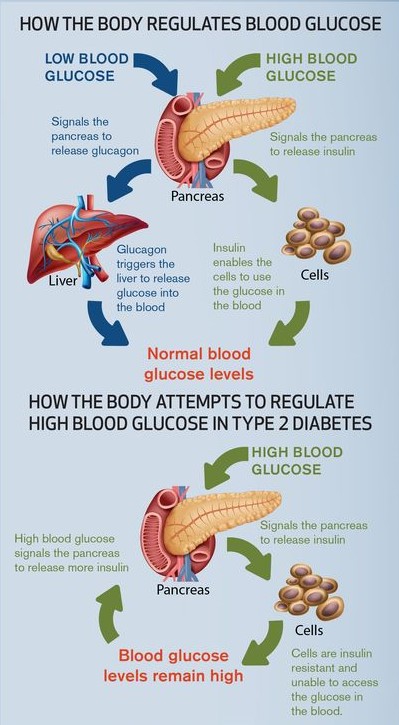
Blog
Type 2 Diabetes: Not Just About Blood Sugar
Insulin Resistance is a metabolic condition that increases the chances of developing type 2 diabetes, heart disease, and stroke.
Insulin is a hormone that regulates the amount of sugar that is in your bloodstream. Insulin moves sugar out of the blood stream into fat, muscle, and liver cells to be stored or used as energy.
When someone has Insulin Resistance, their fat, muscle, and liver cells do not respond to normal levels of insulin and the body has to make more insulin to move the same amount of sugar. You can think of these cells as being "resistant" to insulin's job, and therefore insulin is less effective. If this process continues without interruption and blood sugar levels are not controlled, then type-2 diabetes will develop.

The number of people with diabetes is increasing rapidly, with no end in sight. One-third of adults don’t know they have diabetes, and it is estimated that 90% of prediabetics are unaware they are effected.
 Current guidelines are failing to address this growing issue and continue to offer a Band-Aid approach to care. It is assumed that once someone is diagnosed with Type 2 Diabetes, the condition progressively gets worse and more and more medications will be needed, eventually insulin. The ADA itself states “Using insulin to get blood glucose levels to a healthy level is a good thing, not a bad one.” (diabetes.org)
Current guidelines are failing to address this growing issue and continue to offer a Band-Aid approach to care. It is assumed that once someone is diagnosed with Type 2 Diabetes, the condition progressively gets worse and more and more medications will be needed, eventually insulin. The ADA itself states “Using insulin to get blood glucose levels to a healthy level is a good thing, not a bad one.” (diabetes.org)
A good thing? Hmmm. The more insulin your body is exposed to, the more insulin resistant you become, making it more and more difficult to control blood sugar down the road. If someone already has high insulin, how does giving more insulin “fix” the problem? It doesn’t. Blood sugar will temporarily be controlled but eventually the body adapts to the higher insulin levels and more medication is needed. And that’s the problem we are seeing in our healthcare system.
Managing high blood sugar alone does little for the overall management of Diabetes. The ultimate goal should be reversing the underlying issue: Insulin Resistance…. which just so happens to also lower blood sugar. Treating the Insulin Resistance will reduce the amount of medication needed and eventually return the body to a more normal insulin response.
Want to know the true culprit to obesity, diabetes, and heart disease? Call us today and make an appointment to take control of your health! Medical Weight Loss Specialists of Bismarck:
(701) 354-0964
